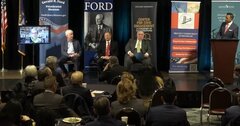

The American experiment has now lasted 249 years. Congratulations to all of us. The country has faced many challenges along the way. More will be coming. It will be easier for us all to face future problems if we try to bolster a great American virtue: civility.
Civility is the basic respect that we give our fellow citizens, even when we disagree on politics. It guides the way we behave toward each other. The citizen is the sovereign and should treat other citizens as equals. And you know how you’re supposed to treat your equals? You don’t lambast them, mock them, or disregard them. You treat them with respect, and you try to win them to your side.
Civility asks you to treat your political opponents as citizens to be persuaded rather than obstacles to be overcome. It is a habit of the heart. We build it over time by extending to people the assumption that they believe what they say and want good things — even when we disagree.
The habit of civility is built with practice. It is easy for us to find reasons to disregard what our opponents say. It takes practice to presume goodwill in people on the other side. Having a productive conversation with others on contentious political issues is a skill set that has to be developed.
Civility is necessary because it is intertwined with the basic setup of American government. As we can see at the start of the Declaration of Independence, each of us has inherent dignity. The whole government apparatus is supposed to be for the people, so let’s treat the people with respect. It's the way American ideals are supposed to work.
Civility is required to maintain the public order. There are 340 million people in this country, which means many people do very different things. Respect for each other allows us to live together.
Given that we will not all agree, civility allows us to figure out what our government should do. We can abide by political decisions that don’t work our way when we know others respect us. We are also given a process that allows for those political decisions to be overturned. We just have to convince more of our fellow citizens that good policy is good if we want things to change.
The North Star in politics is to enact policies that serve the public interest, broadly understood. That is, politics ought not be something we do to others. It ought not be about punishing the people on the other side. Rather, it is something that we do for the common good.
The natural tendency is to use public policy to impose costs on everyone else and enrich ourselves. See James Madison’s warnings about factions in Federalist 10. In America, public policy is supposed to benefit the public, of which we — as individuals or as part of somewhat larger community — are a small part.
Yes, there are limits to civility. The American political system is based on the dignity inherent in our fellow citizens. Denying the dignity of others is not civil. But take care before defenestrating opponents from the public forum for alleged misdeeds. What may sound like a denial of dignity may be something else entirely. There is a lot of speculation about the psychology and motives of strangers in modern political discourse. There are only a few who ultimately profess that their fellow citizens are not worthy of respect. And civility asks us to give the benefit of the doubt to our fellow citizens.
Civility is different from politeness. You can be polite in politics but not civil. That is, you can extend etiquette to opponents without respecting their citizenship. Pass the pepper and salt with courtesy, but if you dismiss their political views, you’re not being civil. People can share strong and opposing views in heated arguments that might be seen as impolite. But as long as they respect each other’s views, the argument remains civil.
Civility is also different from friendliness. You can be friendly to opponents without being civil. People can be great friends, enjoy spending time with each other, share hobbies and have the same tastes in music and culture. But if you can’t respect each other’s politics, you’re not being civil.
Civility is not the same thing as bipartisanship. People can work across the aisle when there are common goals without extending basic respect for each others’ views.
And by the way, “bipartisan” is not a synonym for good policy, either. Many bad ideas get support from both Republicans and Democrats. Special interests secure favors from both sides of the aisle, after all. If government extends a special benefit to a specific group of people at the expense of the many, doing it on a bipartisan basis doesn’t make the action good.
Politics often makes us forget our civility. Being on team red or team blue gives people the belief that those on the other side are not just wrong — clearly wrong — but bad people. This is false. Don’t believe it.
It’s difficult to live with the idea that other people are complicated. It’s much easier to grasp the moral certainty of believing that those who think differently are bad. This shortcut to righteousness is too often both the promised goal and the result of living on partisan promises. It’s a powerful feature of politics. And it’s wrong.
To be sure, morality plays a role in politics. It should. Beliefs and policies are intertwined with ethics. But it is a mistake to think that a person who wound up with a different political conclusion reached the stance through a moral failure.
Yet this kind of incivility is frequent, and many commenters rely on the idea that the people on the other side are morally inferior. Listen to political talk and notice how much of it involves speculation on the improper motives of strangers. This often breaks the bounds of civility.
I don’t recommend that you deny respect to partisan bomb-throwers. They’re giving people what they demand. Outrage keeps people engaged. It bolsters their moral certainty. Expressing outrage has become a business model, which is why it may seem like incivility has gotten worse in the modern era. People looking for outrage find a ready supply of outrage suppliers on all sides.
If you are tempted to fight fire with fire, remember that the fire department usually uses water. Being outraged and angry at the people on the other side is no way to win them over. Being persuasive is hard, though. What works is to be reasonable, try to talk through the issue, understand where your opponents are coming from and try to address their concerns. People appreciate being treated with respect.
It also helps if people look to the political arena for discourse, debate and evidence rather than outrage. My recommendation is to change the channel from the people who may flirt with incivility to commentators who practice civility. The market provides a lot of people, mainstream and otherwise, who do great political commentary. There are people having civil discourse, who try to persuade, and who respect others in the political debate. They should get more attention.
Civil voices are not relegated to minor outlets, either. To give just one instance, check out the editorial pages of The Wall Street Journal. George Will at The Washington Post has been doing his thing for decades. I’ve gotten a lot from Bari Weiss’s podcast “Honestly,” from Jonah Goldberg’s podcast “The Remnant,” and from Ezra Klein’s podcast. They’re pretty good if you’re looking for national political commentary. I’ve worked with dozens of commentators, journalists, and editorialists want to add to the civil debate. It’s what I’m trying to do, too.
And if you see us wander off the path of civility, please don’t disregard everything we say. I am looking to improve and fall short of my ideals. Still, civility also asks us to forgive our fellow citizens when they acknowledge their faults, too.
Committing ourselves to practicing and building civility will strengthen our civil bonds. It will refocus our policy on the public benefit. It will help the nation prosper. And it will ensure that we keep celebrating Independence Day.
Permission to reprint this blog post in whole or in part is hereby granted, provided that the author (or authors) and the Mackinac Center for Public Policy are properly cited.
Get insightful commentary and the most reliable research on Michigan issues sent straight to your inbox.

The Mackinac Center for Public Policy is a nonprofit research and educational institute that advances the principles of free markets and limited government. Through our research and education programs, we challenge government overreach and advocate for a free-market approach to public policy that frees people to realize their potential and dreams.
Please consider contributing to our work to advance a freer and more prosperous state.

Donate | About | Blog | Pressroom | Publications | Careers | Site Map | Email Signup | Contact